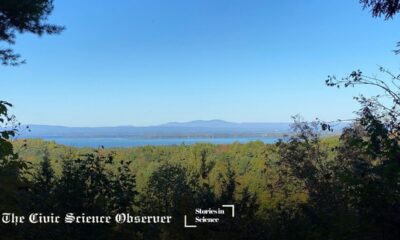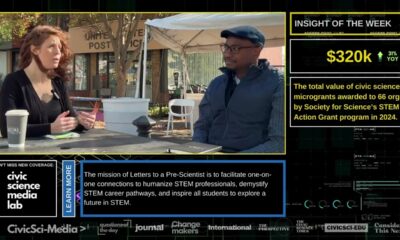Stories in Science Special Series
Unexpected lessons from conducting research with older adults
Julia Nolte: “Becoming a gerontologist has taught me many unexpected things about the way the “stages of life” translate into lifespan research. Given these surprising lessons, my advice to other budding researchers is this: know that being an expert in your field is not only about the formal knowledge you amass.”

Julia Nolte
[su_boxbox title=”About”]Julia Nolte earned a B.Sc. in Psychology from Heidelberg University, Germany, in 2014 followed by an M.Sc. in Psychology in 2017. During her time in Heidelberg, Julia also completed research visits at Cornell University (2015 – 2016), Harvard University (2016), Oxford University (2016), and Cambridge University (2017). Since 2017, Julia has been an M.A./ Ph.D. student at Cornell University’s Human Development Department. In her doctoral work, Julia focuses on the intersection of decision making, lifespan development, and health. You can follow Julia on Twitter here: @Julia_Nolte92. Image by Gerd Altmann from Pixabay. [/su_boxbox]
[su_boxnote note_color=”#c8c8c8″]Story key points:
- Being an expert isn’t only about formal knowledge – real expertise comes from the lessons you will learn beyond the classroom or your desk.
- Don’t pursue your path blindly. Before you start, try to take stock of the things you don’t know.
- If your research involves people, get to know them better – they are your most valuable teachers.[/su_boxnote]

Julia Nolte
[dropcap]A[/dropcap]t some point, you have probably come across this take on the “stages of life:” teenagers have time and energy, but no money; adults in the workforce have money and energy, but no time; and older adults have time and money, but no energy to enjoy them.
If you have encountered these “stages” before, I assume that you have never stopped to consider how different phases of life impact the way scientists conduct lifespan research. For a long time, I didn’t pay the “stages” any mind myself. Now I regret not recognizing their value sooner: If I had, I believe I could have avoided many mistakes I made in my own lifespan research.
Instead, I started my Ph.D. on the psychology of aging with little idea what I was getting myself into.
Prior to my doctoral work, I had no access to the resources necessary to conduct lab-based experiments involving different age groups. Instead, I carried out online studies with the help of strangers who never actually interacted with me. As a result, I had no hands-on experience working with older adults before I committed my life to studying them.
In the years that have passed since then, I have learned a thing or two about aging research that I never thought I would. Here are the lessons that struck me the most.
First, I need to provide some context. When I entered college as a psychology major, I had no intentions of pursuing research, let alone aging research. It wasn’t until I completed an internship on Alzheimer’s disease that I fell in love with lifespan development. My internship entailed answering emails about the prevention, diagnosis, and treatment of dementia that my research institution received from members of the public. To answer these questions, I had to screen and summarize the research record, which often led me to discovering knowledge that I wish everyone had access to. Suddenly, “research” and “aging” were no longer abstract constructs to me. Instead, I realized that studying aging was my best approximation of a super power: anticipating – and knowing how to improve – people’s futures, particularly with regard to their health.
Younger, middle-aged, and older adults do not share the same motivation to participate in research studies.
Although I now study decision making rather than Alzheimer’s disease, I have stayed true to wondering how we can help older adults live long and healthy lives. But to research how aging influences health-related decision making, I never study older adults alone. Instead, I typically compare adults over the age of 60 to younger adults under the age of 35 or to a whole lifespan sample that also includes middle-aged adults.
Much like the “stages of life” suggest, younger, middle-aged, and older adults do not share the same motivation to participate in research studies. Middle-aged adults are the hardest to recruit for in-person experiments. Because they work but also take care of children or older relatives, middle-aged adults are notoriously busy. In addition, the payment we can offer them is often not sizable enough to be worth their time. As a result, my lab-based research is generally limited to studying younger and older adults.
Fortunately, recruiting younger adults into a study is comparatively easy. Because many younger adults have not fully entered the workforce yet, they are drawn in by the promise of payment or extra course credit (Sharp, Pelletier, & Lévesque, 2006). While they often don’t have to care for any dependents, young adults are similar to middle-aged adults in one regard: Like middle-aged adults, younger adults often have places to go and things to do. As a consequence, younger adults will be swift when completing a study and rarely take the time to exchange pleasantries with us researchers.
Older adults, on the other hand, perceive studies as an opportunity to get out of the house and socialize (e.g., Baczynska, Shaw, Patel, Sayer, & Roberts, 2017). In my experience, many older participants enjoy sharing their life stories with researchers and like to strike up conversations during or after an experiment. Not knowing this, I once made the mistake of inviting several older adults to a group testing session. In this session, multiple participants completed a study at the same time. However, each participant was supposed to work quietly by themselves. Although this set-up works well when testing younger adults, bringing together older adults proved to be a real challenge. Rather than focusing on their own answers, older adults started discussing the study, laughed out loud when encountering unexpected questions, and commented on each other’s experiences, such as one man’s struggle to use a broken computer mouse. Needless to say, the group session did not provide the quiet testing environment I had needed to collect quality data. Since then, I have always opted for one-on-one sessions, especially when working with older adults.
Unlike many younger adults, I find that some older adults are not “in it for the money” when participating in research (e.g., Friesen & Williams, 2016). In fact, several older adults have asked me whether we could set up a donation box for those participants who did not want to accept the payment we provide. Of course, it is true that older adults sometimes participate in studies in order to supplement their retirement income or savings. However, many older adults are more enticed to participate by their intellectual interest in research, by altruistic motivations, or the wish to learn about themselves (Baczynska et al., 2017; Jun, Hsieh, & Reinecke, 2017). These participants will often inquire about the goals of a study or contact us to provide feedback about their experiences. “You shouldn’t ask this question” or “this question could be misinterpreted” are sentences I hear often, but typically not from my younger participants.
Older adults keep surprising me with the strategies they use to cope with cognitive loss or other age-related limitations.
Likewise, many of my older participants are “research veterans,” meaning they have already participated in a lot of different research studies. As a result, they will often inform me that they don’t enjoy certain cognitive tests or that they will try hard to “beat” their previous best performance on a task. As researchers, we don’t always account for the fact that our participants might not be the blank slates we hope to encounter. This is problematic because previous experience with a test can sometimes distort our findings. Therefore, working with older adults has taught me to include questions about prior exposure to various types of tasks into my most recent studies.
Finally, I have found that a controlled lab environment is not a good reflection of older participants’ lived experiences. I know this because older adults keep surprising me with the strategies they use to cope with cognitive loss or other age-related limitations. Imagine my bewilderment when an older adult took out their phone to use as a calculator when asked to complete a mathematical task that I had hoped they would be solving in their heads. In a similar instance, I was dismayed to find that an older adult had used their copy of the consent form to take notes during a memory test. Although I champion these behaviors in older adults’ day-to-day lives, “cheating” on assessments invalidates the data I collect in my studies. Since gaining first-hand experience with older participants, I have become more vigilant during data collection and take extra caution to formulate clear task instructions.
In sum, becoming a gerontologist has taught me many unexpected things about the way the “stages of life” translate into lifespan research. Given these surprising lessons, my advice to other budding researchers is this: know that being an expert in your field is not only about the formal knowledge you amass. Instead, expertise also consists of the many small things you cannot learn in the classroom or from behind your desk. Take stock of the things you do know and the things you might not know about the research you aim to conduct. Rather than only looking for the science generated by your field, seek out handbooks, blog posts, best-practice writing, and other unspoken knowledge on how to actually complete research within your field. Ask your mentors and more experienced students about what they wish they had known before starting their careers or which skills they needed to acquire in order to succeed in those careers. Then pay it forward by sharing your insights with those who are less experienced than you.
But most importantly, if your research involves people, get to know them better. In many ways, they will be your most valuable teachers.
References:
Baczynska, A. M., Shaw, S. C., Patel, H. P., Sayer, A. A., & Roberts, H. C. (2017). Learning from older peoples’ reasons for participating in demanding, intensive epidemiological studies: A qualitative study. BMC Medical Research Methodology, 17, 167. doi: 10.1186/s12874-017-0439-9
Friesen, L. R., & Williams, K. B. (2016). Attitudes and motivations regarding willingness to participate in dental clinical trials. Contemporary Clinical Trials Communications, 2, 85-90. doi: 10.1016/j.conctc.2015.12.011
Jun, E., Hsieh, G., & Reinecke, K. (2017). Types of motivation affect study selection, attention, and dropouts in online experiments. Proc. ACM Hum.-Comput. Interact, 1(1), 1-15. https://doi.org/10.1145/3134691
Sharp, E. C., Pelletier, L. G., & Lévesque, C. (2006). The double-edged sword of rewards for participation in psychology experiments. Canadian Journal of Behavioral Science, 38(3), 269-277. doi: 10.1037/cjbs2006014
Metrics
Sessions
Total number of Sessions. A session is the period time a user is actively engaged with the page.
Visitors
Users that have had at least one session within the selected date range. Includes both new and returning users.
Page views
Pageviews is the total number of time the article was viewed. Repeated views are counted.
The CS Media Lab is a Boston-anchored civic science news collective with local, national and global coverage on TV, digital print, and radio through CivicSciTV, CivicSciTimes, and CivicSciRadio. Programs include Questions of the Day, Changemakers, QuickTake, Consider This Next, Stories in Science, Sai Resident Collective and more.

-
Audio Studio1 month ago
“Reading it opened up a whole new world.” Kim Steele on building her company ‘Documentaries Don’t Work’
-
 Civic Science Observer1 week ago
Civic Science Observer1 week ago‘Science policy’ Google searches spiked in 2025. What does that mean?
-
Civic Science Observer1 month ago
Our developing civic science photojournalism experiment: Photos from 2025
-
Civic Science Observer1 month ago
Together again: Day 1 of the 2025 ASTC conference in black and white
Contact
Menu
Designed with WordPress
























